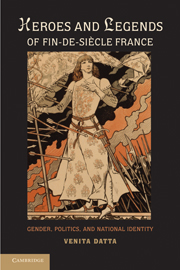Book contents
- Frontmatter
- Contents
- Acknowledgments
- Introduction: The Fin-de-Siècle Cult of Heroes
- 1 Gender, Class, and Heroism in the Bazar de la Charité Fire of 1897
- 2 Cyrano: A Hero for the Fin de Siècle?
- 3 “L'Appel au Soldat”: Visions of the Napoleonic Legend in Popular Culture
- 4 On the Boulevards: Representations of Joan of Arc in the Popular Theater
- 5 Opium, Gambling, and the Demimondaine: The Ullmo Spy Case of 1907–1908
- Conclusion: From One War to the Next: The End of Heroes?
- Selected Bibliography
- Index
5 - Opium, Gambling, and the Demimondaine: The Ullmo Spy Case of 1907–1908
Published online by Cambridge University Press: 05 June 2012
- Frontmatter
- Contents
- Acknowledgments
- Introduction: The Fin-de-Siècle Cult of Heroes
- 1 Gender, Class, and Heroism in the Bazar de la Charité Fire of 1897
- 2 Cyrano: A Hero for the Fin de Siècle?
- 3 “L'Appel au Soldat”: Visions of the Napoleonic Legend in Popular Culture
- 4 On the Boulevards: Representations of Joan of Arc in the Popular Theater
- 5 Opium, Gambling, and the Demimondaine: The Ullmo Spy Case of 1907–1908
- Conclusion: From One War to the Next: The End of Heroes?
- Selected Bibliography
- Index
Summary
Hegel remarks somewhere that all great, world-historical facts and personages occur, as it were, twice. He has forgotten to add: the first time as tragedy, the second as farce.
– Karl MarxAs the fin de siècle shaded off into the belle époque, the French were more united than previously, not only around the heroic legacy of Joan of Arc, especially in 1909, but also a few months earlier, over the Ullmo spy case, which captivated national attention in late 1907 through early 1908. On October 25, 1907, French newspapers were filled with reports of a naval officer accused of having stolen valuable documents concerning France's national defense. The details of his capture could not have been more burlesque than a scene from Maurice Leblanc's popular Arsène Lupin (the “gentleman burglar”) detective series. Charles-Benjamin Ullmo, a naval ensign, second in command of the counter-torpedo boat Carabine, had been lured and then captured by officers of the Sûreté générale at the gorges of Ollioules, a secluded spot some twelve kilometers outside of Toulon on October 22. Ullmo had set up a meeting with the Sûreté agent, thinking him to be a representative of the Naval Ministry, having earlier written to the Naval Minister Gaston Thomson, offering to sell France secret documents in his possession for 150,000 francs. He would sell them to a foreign power, he threatened, if the Ministry rejected his offer.
- Type
- Chapter
- Information
- Heroes and Legends of Fin-de-Siècle FranceGender, Politics, and National Identity, pp. 179 - 225Publisher: Cambridge University PressPrint publication year: 2011
- 1
- Cited by



